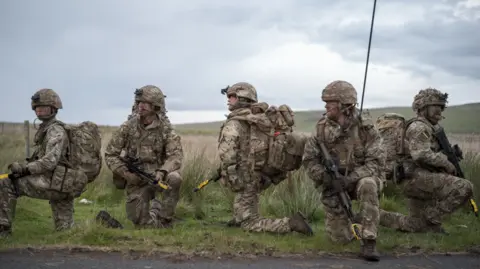UK must ‘actively prepare’ for war scenario, government warns

 Getty Images
Getty ImagesThe UK must “actively prepare for the possibility of the UK coming under direct threat, potentially in a wartime scenario,” the government has warned.
Its national security strategy, it said the nation was “in an era in which we face confrontation with those who are threatening security” and pointed to Russia’s war against Ukraine as “the most obvious and pressing example of this”.
The document also referred to “Iranian hostile activity on British soil” and “adversaries” planning how to disrupt energy or supply chains.
It called for an “all-of-society effort” to make the UK more secure, adding the country would “have to pull together”.
The document was released at the same time as a summit of Nato – a defence alliance of European North American nations – began in the Netherlands.
At the gathering, leaders of the 32 nations are set to commit to increasing their security spending to 5% of national income by 2035, made up of 3.5% on core military spending and 1.5% on broader security expenditure.
Speaking in the House of Commons, Cabinet Office minister Pat McFadden said the strategy offered a “plan that is both clear-eyed and hard-edged about the challenges we face.”
He said the strategy aimed to bolster border security, improve co-ordination with allies and boost the UK’s capabilities in areas such as shipbuilding, nuclear power and artificial intelligence (AI).
McFadden also said the government would be spending £1bn on a “new network of national biosecurity centres” aimed at improving the UK’s defences against biological attacks.
The strategy said the UK had to reduce “our dependence on others, including the ability of adversaries to coerce or manipulate us”.
The strategy said threats from other countries were on the rise, and that the UK had been “directly threatened by hostile activities including assassination, intimidation, espionage, sabotage, cyber attacks and other forms of democratic interference”.
Adversaries were spreading disinformation and using social media to stoke “tensions between generations, genders and ethnic groups,” it said.
Critical infrastructure such as undersea cables would “continue to be a target”, the document added.
McFadden told MPs the government would be “clear-eyed” about how it engaged with major powers such as China “where we must protect our national security and promote our economic interests”.
Immediately after McFadden addressed MPs, Foreign Secretary David Lammy gave a statement in Parliament on the government’s China audit, which examined the UK’s relationship with Beijing.
He said the audit would not be published because it contained classified material, but set out a summary of its findings.
He described China as a “sophisticated and persistent threat” but said the country’s power was “an inescapable fact”.
“Not engaging with China is therefore no choice at all,” he said, as he acknowledged the government’s desire for a trade relationship with the superpower.
He said the UK’s approach would be grounded in “progressive realism… taking the world as it is, not as we wish it to be”.
“We will co-operate where we can and we will challenge where we must,” he said, adding that meant “never compromising on our national security”.
Conservative shadow foreign secretary Priti Patel said the audit failed to set up “any kind of serious strategic framework”.
“And we know why – the government has gone cap in hand to China to bail out its terrible handling of the British economy,” she added.
Source link






